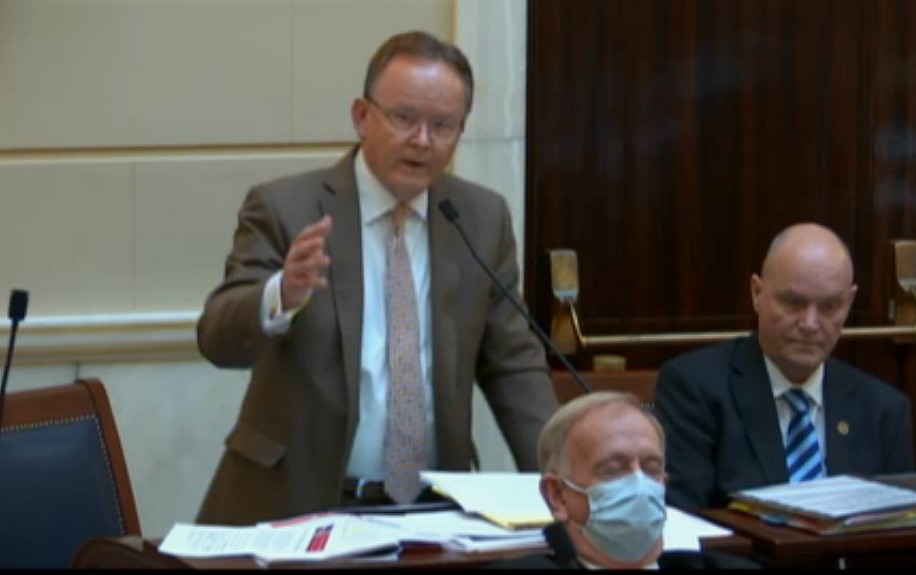
ST. GEORGE – Utah is now a signature away from being the first state to have a blood alcohol content limit of 0.05.
2017’s House Bill 155, Driving Under the Influence and Public Safety Revisions, passed the Utah Senate Wednesday in a 17-12 vote. It passed the Utah House in February with a 48-26 vote. It now moves to the desk of Gov. Gary Herbert for consideration.

“Many people believe impairment begins at 0.08,” Senate Majority Whip Stuart Adams, R-Layton, the bill’s co-sponsor, said on the Senate floor. “That is simply untrue.”
At a 0.05 BAC limit, Adams said, drivers are impaired, even if they don’t realize it.
At that limit a driver can have problems with small muscle control, have impaired judgment and a lack of inhibition, have reduced coordination and ability to track movement, as well as a reduced ability to respond to emergency driving situations, Adams said.
“(It’s) enough to impair their ability to drive,” he said.
While Utah would be the first state in the nation to adopt a 0.05 BAC limit, Adams pointed to Canada and many European and Asian nations that enforce a 0.05 limit.
An estimated 80 percent of the world’s population is under that limit, Adams said. The United States is in the minority, he said.
“I think we need to send a message (that) you should not drink and drive,” Sen. Lyle Hillyard, R-Logan, said.
Others on the Senate floor weren’t so sure about the bill.

Sen. James Dabakis, D-Salt Lake City, argued that studies supporting a need to lower the BAC limit weren’t there, and that Utah should let another state try lower the drunk driving threshold first. At least that way there could be data to start working from after a while.
For example, it is currently unknown if impairment-related arrests will increase or not due to lowering the limit because it hasn’t been done in any other state yet.
Adams argued there was enough data already, and cited studies from the National Transportation Safety Board, which supports the bill and an overall, nationwide move to a 0.05 BAC limit.
According to the NTSB, 63 lives are lost each year on Utah roads due to impaired driving, Adams said, and he believes that lowering the BAC limit will help save lives.
As to increased arrests, Rep. Norman Thurston, R-Provo, previously said any increase in DUI-related arrests would not be as dramatic as the bill’s opponents claimed.
However, Dabakis said a 0.05 BAC limit is less impairment than what someone experiences while talking on a mobile phone via a hands-free device as they drive.
“Many new DUIs,” he said over Twitter.
Utah just passes lowest DUI in America at .05. Less impairment than talking handless on cell phone. Many new DUI’s #utpol
— Jim Dabakis (@JimDabakis) March 9, 2017
The Libertas Institute, a libertarian think-tank that also opposes the 0.05 BAC limit, repeated a concern over Twitter that the law could target otherwise lawful drivers.
Sleepiness, daydreaming, looking at billboards, talking to a rider or on the phone, etc all cause impairment. Criminalize everything? #utpol
— Libertas Institute (@LibertasUtah) March 9, 2017
We agree that people should not drink and drive (whatever their BAC), but doing so does not inherently justify criminal consequences. #utpol
— Libertas Institute (@LibertasUtah) March 9, 2017
Dabakis was also concerned that Utah, a state that already has a reputation for weirdness when it comes to alcohol law, may be hurting its future tourism prospects by passing the new BAC limit. He also said that, according to Mothers Against Drink Driving, less than 1 percent of fatal DUI crashes involved BAC levels of less than 0.08.
“Utah leads,” Adams said. “I think we ought to lead now.”
Southern Utah Sens. Ralph Okerlund and Don Ipson voted for the bill, while Sens. Evan Vickers and David Hinkins voted against it.
Southern Utah Reps. Walt Brooks, Merrill Nelson, Brad Last, John Westwood, Mike Noel, V. Lowry Snow and Jon Stanard each voted for the bill.
Resources
- Read the bill: 2017 HB 155 Driving Under the Influence and Public Safety Revisions, First Substitute
- To contact your legislators:
- Bill sponsor: Norman Thurston | Co-sponsor: Sen. J. Stuart Adams
- Southern Utah Sens. Ralph Okerlund, Don Ipson, Evan Vickers and David Hinkins | Listing of all senators.
- Southern Utah Reps. Walt Brooks, Merrill Nelson, Brad Last, John Westwood, Mike Noel, V. Lowry Snow and Jon Stanard | Listing of all members of the House of Representatives
Read more: See all St. George News reports on Utah Legislature 2017 issues
Email: [email protected]
Twitter: @MoriKessler
Copyright St. George News, SaintGeorgeUtah.com LLC, 2017, all rights reserved.